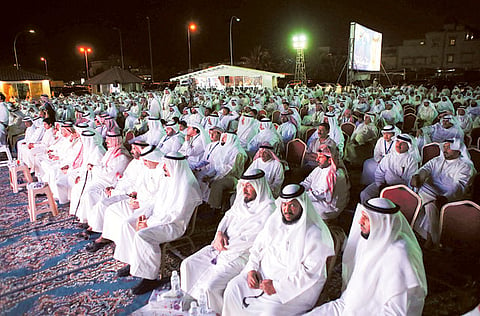Kuwaitis head to polls for sixth time since 2006
Sweltering heat, Ramadan fasting, boycott calls to test enthusiasm

Manama: Around 440,000 Kuwaiti men and women are scheduled to brave the twin challenges of sweltering heat and long hours of fasting to cast their ballots on Saturday in the country’s second parliamentary elections in eight months.
High stakes in the election of the 14th parliament in the country’s history include the level of the turnout in the most unusual Ramadan polls, the impact of the boycott calls by a fractured opposition, the number of women who would win seats and the performance of tribal and Islamist candidates under the one-vote-per-voter system.
“The polling stations will be open from 8 am until 8 pm and will not be closed at any time,” Ahmad Al Ajeel, the head of the high judiciary commission, tasked with supervising the elections, said, referring to claims that the polling centres could be temporarily shut down to allow judges and voters to break their fast.
Under Kuwaiti rules, the elections had to be held on July 27, 18 days into the month of fasting when Muslims abstain from food and drink from sunrise until sunset. On Saturday, iftar, the sunset breaking of the fast, is at 6:44 pm.
“The commission has appointed 803 judges to help ensure the election process is smooth. There will be no effect of the fast breaking time on the voting. Should a judge decide to break his fast or to perform prayers, he will be replaced by the substitute judge,” he said at a press conference ahead of the elections.
According to final figures, 233,619 (53.13 per cent) of the 439,715 eligible voters are women while 206,096 (46.87 per cent) are men.
However, the higher figure of women voters is not expected to help more women into the parliament, which has in the past been overwhelmingly dominated by men.
Women made history in 2009 when four female candidates won seats, a feat that will be almost repeated in December when three women were elected to the 50-member parliament. Earlier in February 2012, no woman could break through the robust social cordon that enabled tribal and Islamist figures to carry all the constituencies.
However, in the absence of major opposition figures who have led or supported calls to boycott the elections, women candidates may see their chances of winning seats boosted.
The opposition has insisted that it would not participate in the national polls under the one-vote system introduced last year by a decree that amended the electoral law and slashed the number of candidates a voter could elect from four to one.
For the government, the amendment addressed possible legal loopholes and brought the nation in line with international standards.
However, for the opposition, it aimed to curb its influence and ensure the election of a rubber-stamp parliament.
The Constitutional Court, the country’s highest court, in June ruled in support of the amendment, prompting some of the tribes and political groups that boycotted the December elections to reverse their stance. However, other opposition figures, left to lick their wounds, vowed to boycott the elections and to campaign against participation.
They now hope that the sweltering July heat and the Ramadan fasting would be additional elements to personal convictions to keep Kuwaitis away from the polling stations and result in a low turnout that would affect the credibility of the process.
However, candidates have insisted that the participation rate would be high despite the heat and the fasting.
“If elections were held every month, we would participate in them in order to confront the systematic sabotage by those who conspire against Kuwait,” Abdul Hameed Dashti was quoted as saying, in an indication of the divisions within the Kuwaiti society over political developments in the country since 2006.
The political malaise and lack of cooperation between the government and the parliament has resulted in the formation of several cabinets and in holding five parliamentary elections. On Saturday, Kuwaitis will head for the sixth time in seven years to polling stations to elect a parliament.
The July campaigning was dominated by news of the arrests of candidates and their supporters who were involved in secret plots to purchase votes.
In coordinated swoops, the interior ministry busted several makeshift offices where middle men and women were negotiating with voters over their votes.


